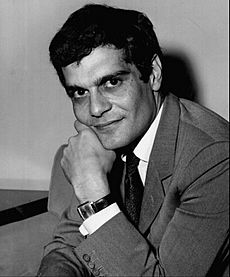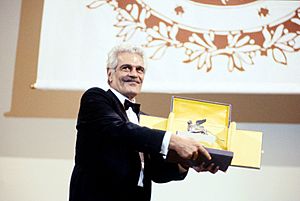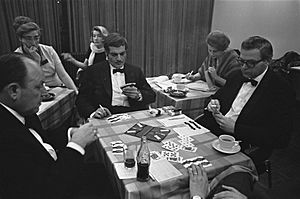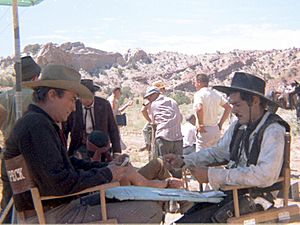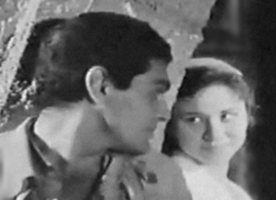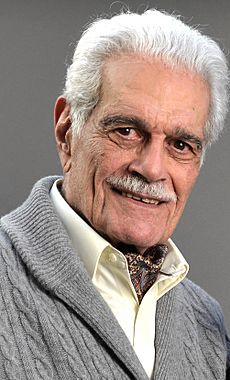Omar Sharif facts for kids
Quick facts for kids
OME
Omar Sharif
|
|
|---|---|
| عمر شريف | |
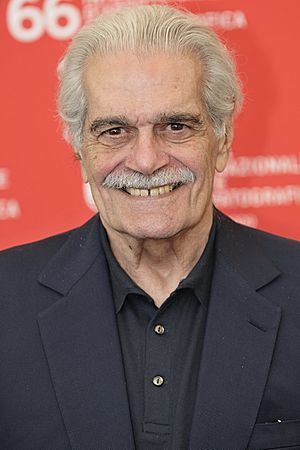
Sharif in 2009
|
|
| Born |
Michel Yusef Dimitri Chalhoub
10 April 1932 |
| Died | 10 July 2015 (aged 83) Cairo, Egypt
|
| Burial place | Al-Sayyida Nafisa Cemetery |
| Nationality | Egyptian |
| Other names | Omar el-Sherief, Omar Cherif |
| Education | Victoria College, Alexandria |
| Alma mater | Cairo University |
| Occupation | Actor |
| Years active | 1954–2015 |
| Spouse(s) | |
| Children | 1 |
| Relatives | Omar Sharif Jr. (grandson) |
| Awards |
|
| Honours | |
Omar Sharif (Arabic: عمر الشريف; born Michel Yusef Dimitri Chalhoub, 10 April 1932 – 10 July 2015) was a famous Egyptian actor. Many people consider him one of Egypt's greatest male film stars. He started his acting career in Egypt in the 1950s. Later, he became well-known for his roles in American, British, French, and Italian movies.
Omar Sharif acted in over 100 films during his 50-year career. He won many awards, including three Golden Globe Awards and a César Award for Best Actor. He starred as Sherif Ali in the epic film Lawrence of Arabia (1962). This role earned him an Academy Award nomination. He also played the main character in Doctor Zhivago (1965). For this, he won a Golden Globe for Best Actor.
Sharif also played romantic leads in movies like Funny Girl (1968). He took on historical roles, such as Genghis Khan (1965) and Che Guevara in Che! (1969). His acting career lasted until he was an old man. He received praise for his role in the French film Monsieur Ibrahim (2003). His last movie was in 2015, the year he passed away.
Omar Sharif could speak five languages: Arabic, English, French, Italian, and Spanish. He loved horse racing and was once a top contract bridge player. He received important awards from different countries. These included Egypt's Order of Merit and France's Legion of Honour.
Contents
Early Life and Education
Omar Sharif was born Michel Yusef Dimitri Chalhoub in Alexandria, Kingdom of Egypt (now Arab Republic of Egypt). His family was Melkite Greek Catholic and came from Lebanon. He later changed his name to Omar Sharif, which means "noble" in Arabic, after becoming a Muslim in the 1950s.
His father, Yusef Chalhoub, was a merchant who sold precious wood. His family moved to Cairo when Omar was four years old. As a young boy, Sharif studied at Victoria College, Alexandria. He was very good at learning languages. After college, he earned a degree in mathematics and physics from Cairo University. He worked in his father's business for a short time before starting his acting career. In 1955, he officially began using the stage name "Omar Sharif." He married Faten Hamama, who was also an Egyptian actress.
Becoming a Movie Star
Egyptian Film Career
In 1954, Omar Sharif started his acting journey in Egypt. His first movie was Struggle in the Valley (1954). He quickly became a popular star in Egyptian films. He appeared in movies like Our Beautiful Days (1955) and Struggle in the Pier (1956).
He and his wife, Faten Hamama, often starred together in romantic movies. Some of their popular films included Struggle on the Nile (1959) and The River of Love (1960). These roles made him a big name in Egyptian cinema.
Hollywood Success
Lawrence of Arabia
Omar Sharif's first role in an English-language film was in 1962. He played Sherif Ali in David Lean's huge historical movie, Lawrence of Arabia. Sharif got the part after other actors turned it down. At the time, he was not well-known outside of Egypt.
Director David Lean wanted to use actors from the region to make the film feel real. Sharif's ability to speak many languages and his unique accent helped him play foreign characters. He said his accent allowed him to "play the role of a foreigner without anyone knowing exactly where I came from." This helped him a lot throughout his career.
To get the role, Sharif had to sign a contract to make seven films with Columbia Pictures. Lawrence of Arabia was a huge success with both audiences and critics. Sharif's performance earned him an Academy Award for Best Supporting Actor nomination. He also won a Golden Globe Award for Best Supporting Actor – Motion Picture.
After Lawrence of Arabia, Sharif starred in The Fall of the Roman Empire (1964). He played a supporting role as Sohamus. He also appeared in Behold a Pale Horse (1964). The director, Fred Zinnemann, chose Sharif because David Lean highly recommended him. A film historian said Sharif gave a "truly wonderful performance." He also noted how different his roles were in Lawrence of Arabia and Behold a Pale Horse.
Sharif was one of many stars in The Yellow Rolls-Royce (1964), which was a popular movie. He then got his first main role in a Hollywood film, playing the title character in Genghis Khan (1965).
Doctor Zhivago
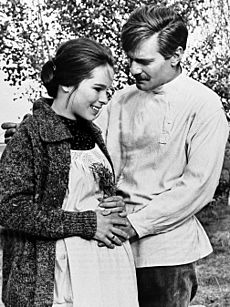
While filming Genghis Khan, Sharif learned that David Lean was making Doctor Zhivago (1965). This movie was based on a famous novel. Sharif loved the book and wanted a small role in the film. But Lean decided to cast him as the main character, Yuri Zhivago, who was a poet and doctor.
The film was a massive hit. For his acting, Sharif won the Golden Globe Award for Best Actor – Motion Picture Drama. Doctor Zhivago is still one of the highest-grossing films of all time when you consider inflation.
Sharif then appeared in The Poppy Is Also a Flower (1966). He worked again with Peter O'Toole and producer Sam Spiegel in The Night of the Generals (1967). He played a German officer in World War II. He also starred with Sophia Loren in More Than a Miracle (1967).
Funny Girl
Sharif was also praised for his role as Nicky Arnstein in Funny Girl (1968). He played the husband of Fanny Brice, who was played by Barbra Streisand in her first movie. His choice to work with Streisand upset the Egyptian government. This was because she supported Israel, and Egypt was at war with Israel at the time. The movie was banned in many Arab countries.
Sharif and Streisand became romantically involved during the filming. He later said that he didn't find her attractive at first. But he soon fell deeply in love with her.
Other Films and Later Career
Sharif continued to act in many films. He co-starred with Catherine Deneuve in Mayerling (1968). The next year, he was reunited with Gregory Peck in the western Mackenna's Gold (1969). He also played Che Guevara in Che! (1969).
He appeared in The Last Valley (1971) with Michael Caine. He also made The Horsemen (1971). Sharif later said that some of these films were not very good. He felt he made them because he needed the money.
In the 1970s, Sharif played Captain Nemo in a TV adaptation of Mysterious Island (1973). He starred with Julie Andrews in the romantic thriller The Tamarind Seed (1974). He also reprised his role as Nick Arnstein in Funny Lady (1975), the sequel to Funny Girl.
During the 1980s, Sharif took on various roles in movies and television. He appeared in Top Secret! (1984), a comedy. He also worked steadily in TV miniseries like Peter the Great (1986) and Anastasia: The Mystery of Anna (1986).
In the 1990s, Sharif reunited with Peter O'Toole in The Rainbow Thief (1990). He also starred in the documentary Lebanon...Imprisoned Splendour (1996). In this film, he shared stories about his Lebanese family and recited poetry. His role in The 13th Warrior (1999) disappointed him. He decided to take a break from major films.
Monsieur Ibrahim and Final Roles
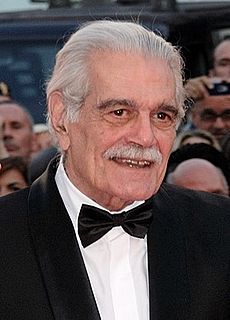
In 2003, Omar Sharif received great praise for his main role in Monsieur Ibrahim. This French film was based on a novel. He played a Muslim Turkish merchant who becomes like a father to a Jewish boy. For this performance, Sharif won the César Award for Best Actor.
Sharif's later film roles included Hidalgo (2004) and One Night with the King (2006), where he again worked with Peter O'Toole. He was also the narrator for 10,000 BC (2008). In Egypt, he starred in Hassan and Marcus (2008).
His very last acting role was in the short film 1001 Inventions and the World of Ibn Al-Haytham (2015). This film was part of a campaign by the United Nations and UNESCO.
Contract Bridge Career
Omar Sharif said that contract bridge was his true passion. At one point, he was ranked among the world's top 50 bridge players. He even represented Egypt in the 1964 and 1968 World Bridge Olympiads.
In 1967, he created the Omar Sharif Bridge Circus. This group of professional players, including some of the best from Italy, toured the world to promote bridge. They played exhibition matches that thousands of people watched. The matches were shown using a new technology called Bridge-O-Rama.
Sharif also wrote or co-wrote several books about bridge. He even licensed his name to a bridge video game called Omar Sharif Bridge. By the year 2000, Sharif had stopped playing bridge completely. However, he continued to allow his name to be used for bridge software.
Personal Life
Family and Relationships
Omar Sharif lived in Egypt until 1965, when he moved to Europe. In 1954, he starred in the film Struggle in the Valley with Faten Hamama. They fell in love, and Sharif converted to Islam and married her. They had one son, Tarek Sharif, born in 1957. Tarek even appeared in Doctor Zhivago as a young Yuri.
Omar and Faten separated in 1966 and divorced in 1974. Sharif never married again. He said he never fell in love with another woman after his divorce.
The Egyptian government made it difficult for Sharif to travel for international films. This influenced his decision to stay in Europe between film shoots. This choice, however, led to the end of his marriage. He said that fame and Hollywood brought him "glory, but it gave me loneliness also."
Sharif became very good friends with Peter O'Toole while making Lawrence of Arabia. They acted in several other films together and remained close. He also loved Hull City Association Football Club and would call from Paris to get score updates.
In his later years, Sharif lived mostly in Cairo with his family. Besides his son Tarek, he had two grandsons, Omar Sharif Jr (who is also an actor) and Karim.
Health and Passing
Omar Sharif had heart surgery in 1992 and a mild heart attack in 1994. He stopped smoking after his surgery.
In May 2015, it was reported that Sharif was suffering from Alzheimer's disease. His son, Tarek Sharif, said that his father was getting confused. He would mix up the names of his most famous films, Doctor Zhivago and Lawrence of Arabia.
On 10 July 2015, Omar Sharif passed away from a heart attack at a hospital in Cairo. His funeral was held two days later at the Grand Mosque of Mushir Tantawi in Cairo. His coffin was covered in the Egyptian flag. He was buried in the El-Sayeda Nafisa cemetery.
Awards and Honours
At the 35th Academy Awards, Omar Sharif was nominated for Best Supporting Actor for his role in Lawrence of Arabia. He won two Golden Globe awards for this role in the same year. In 1966, he won a third Golden Globe award for his main role in Doctor Zhivago.
In November 2005, Sharif received the first-ever Sergei Eisenstein Medal from UNESCO. This award recognized his important contributions to world film and cultural diversity.
 Egypt: Grand Cross of the Order of Merit (Egypt)
Egypt: Grand Cross of the Order of Merit (Egypt) France: Knight of the Legion of Honour
France: Knight of the Legion of Honour Morocco: Commander of the Order of Ouissam Alaouite
Morocco: Commander of the Order of Ouissam Alaouite
Filmography
| Year | Title | Role | Notes |
|---|---|---|---|
| 1954 | Shaytan al-Sahra | Essam | Also known as Devil of the Sahara |
| Sira` Fi al-Wadi | Ahmed | Also known as The Blazing Sun, Struggle in the Valley and Fight in the Valley | |
| 1955 | Ayyamna al-Holwa | Ahmed | Also known as Our Best Days |
| 1956 | La Châtelaine du Liban | Mokrir | Also known as The Lebanese Mission; credited as Omar Cherif |
| Sira` Fi al-Mina | Ragab | Also known as A Fight Within the Port | |
| 1957 | La Anam | Aziz | Also known as Sleepless and No Tomorrow |
| Ard al-Salam | Ahmed | Also known as Land of Peace | |
| 1958 | Goha | Goha | Credited as Omar Cherif |
| Shatie el asrar | Mamdoh | Also known as Beach of Secrets | |
| Ghaltet habibi | Salah | Also known as My Lover's Fault | |
| 1959 | Siraa fil Nil | Muhassab | Also known as Struggle on the Nile |
| Sayyidat al-Qasr | Adel | Also known as Lady of the Palace | |
| Min ajal emraa | Shokri | Also known as For a Woman | |
| Maweed maa maghoul | Madgi | Also known as An Appointment with the Unknown | |
| Fadiha fil Zamalek | Ahmed | Also known as Scandel in Zamalek | |
| 1960 | Nahna el talamiza | Adel | Also known as We Are the Students |
| Lawet el hub | Hasan | Also known as Love Sickness | |
| 1961 | Gharam el assiad | Essam Murad | Also known as Masters Love |
| Bidaya wa Nihaya | Hassanien | Also known as A Beginning and an End | |
| Esha'a hob | Hussein | Also known as A Rumor of Love | |
| Nahr al-Hob | Khalid | Also known as The River of Love | |
| Hobi al-Wahid | Captain Adel | Also known as My Only Love | |
| Fi Baytouna Ragoul | Ibrahim | Also known as في بيتنا رجل and A Man in our House | |
| 1962 | Lawrence of Arabia | Sherif Ali ibn el Kharish | Golden Globe Award for Best Supporting Actor – Motion Picture Golden Globe Award for New Star of the Year – Actor Nominated – Academy Award for Best Supporting Actor |
| 1964 | The Fall of the Roman Empire | Sohamus | |
| Behold a Pale Horse | Francisco | ||
| The Yellow Rolls-Royce | Davich | ||
| 1965 | Genghis Khan | Genghis Khan | |
| Marco the Magnificent | Sheik Alla Hou, 'The Desert Wind' | ||
| Doctor Zhivago | Dr. Yuri Andreyevich Zhivago | Golden Globe Award for Best Actor – Motion Picture Drama | |
| El mamalik | Ahmed | ||
| 1967 | The Night of the Generals | Major Grau | |
| More Than a Miracle | Prince Rodrigo Fernandez | ||
| 1968 | Funny Girl | Nicky Arnstein | |
| Mayerling | Archduke Rudolf | ||
| 1969 | Mackenna's Gold | John Colorado | |
| The Appointment | Frenderico Fendi | ||
| Che! | Che Guevara | ||
| Trois hommes sur un cheval | Un turfiste | Uncredited | |
| 1971 | The Last Valley | Vogel | |
| The Horsemen | Uraz | ||
| The Burglars | Abel Zacharia | Simultaneously shot in French as Le Casse with the same cast | |
| 1972 | Le Droit d'aimer | Pierre | |
| 1973 | The Mysterious Island | Captain Nemo | |
| 1974 | The Tamarind Seed | Feodor Sverdlov | |
| Juggernaut | Captain Alex Brunel | ||
| 1975 | Funny Lady | Nicky Arnstein | |
| 1976 | Ace Up My Sleeve | Andre Ferren | Also known as Crime and Passion |
| The Pink Panther Strikes Again | Egyptian Assassin | Cameo; uncredited | |
| 1979 | Ashanti: Land of No Mercy | Prince Hassan | |
| Bloodline | Ivo Palazzi | ||
| 1980 | S*H*E | Baron Cesare Magnasco | Also known as S*H*E: Security Hazards Expert |
| The Baltimore Bullet | The Deacon | ||
| Oh! Heavenly Dog | Malcolm Bart | ||
| 1981 | Green Ice | Meno Argenti | |
| Inchon | Indian officer | Cameo; uncredited | |
| 1983 | Ayoub | ||
| 1984 | Top Secret! | Agent Cedric | |
| 1987 | Grand Larceny | Rashid Saud | |
| 1988 | Rambo III | Masoud | |
| The Possessed | Stepan | Also known as Les Possédés | |
| Les Pyramides bleues | Alex | Also known as The Novice | |
| Keys to Freedom | Jonathan | ||
| 1989 | Al-aragoz | Mohamed Gad El Kareem | Also known as The Puppeteer |
| 1990 | Mountains of the Moon | Sultan | Uncredited |
| Viaggio d'amore | Rico | ||
| The Rainbow Thief | Dima | ||
| 1991 | War in the Land of Egypt | Also known as El Mowaten Masri and An Egyptian Citizen | |
| Mayrig | Hagop | ||
| 1992 | 588 rue paradis | Hagop | Also known as Mother |
| Beyond Justice | Emir Beni-Zair | ||
| Tengoku no Taizai | Tsai Mang Hua | ||
| 1993 | Dehk we le'b we gad we hob | Also known as Laughter, Games, Seriousness and Love | |
| 1996 | Lebanon...Imprisoned Splendour | Himself | Documentary |
| 1997 | Heaven Before I Die | Kahlil Gibran | |
| 1998 | Mysteries of Egypt | Grandfather | Documentary |
| 1999 | The 13th Warrior | Melchisideck | |
| 2001 | Censor | ||
| The Parole Officer | Victor | ||
| 2003 | Monsieur Ibrahim | Monsieur Ibrahim | César Award for Best Actor |
| 2004 | Hidalgo | Sheikh Riyadh | |
| 2006 | Fuoco su di me | Principe Nicola | |
| One Night with the King | Prince Memucan | ||
| 2008 | 10,000 BC | Narrator | Voice |
| Hassan & Marcus | Hassan / Morcus | Also known as Hassan wa Morcus | |
| 2009 | The Traveller | Older Hassan | Commonly known as Al Mosafer |
| J'ai oublié de te dire | Jaume | Also known as I Forgot to Tell You | |
| 2013 | A Castle in Italy | Himself | |
| Rock the Casbah | Moulay Hassan | ||
| 2015 | 1001 Inventions and the World of Ibn Al-Haytham | Grandfather | Film lead role (final film role) |
| Year | Title | Role | Notes |
|---|---|---|---|
| 1966 | The Poppy Is Also a Flower | Dr. Rad | TV movie |
| 1973 | The Mysterious Island | Captain Nemo | TV miniseries; also known as L'Ile Mysterieuse |
| 1980 | Pleasure Palace | Louis Lefevre | TV movie |
| 1984 | The Far Pavilions | Koda Dad | TV miniseries, based on The Far Pavilions |
| 1985 | Vicious Circle | Joseph Garcin | TV play |
| Edge of the Wind | McCorquodale | TV play by Don Webb, with John Mills and Lucy Gutteridge | |
| 1986 | Peter the Great | Prince Feodor Romodanovsky | TV miniseries |
| Harem | Sultan Hassan | TV miniseries | |
| Anastasia: The Mystery of Anna | Czar Nicholas II | TV miniseries | |
| 1991 | Memories of Midnight | Constantin Demiris | TV movie |
| 1992 | Mrs. 'Arris Goes to Paris | Marquis Hippolite | TV movie |
| 1995 | Catherine the Great | Razumovsky | TV movie |
| 1996 | Gulliver's Travels | The Sorcerer | TV miniseries |
| 1999 | Cleopatra's Palace: In Search of a Legend | Narrator | Documentary |
| 2001 | Shaka Zulu: The Citadel | The King | TV movie |
| 2002 | Building the Great Pyramid | Narrator | Documentary |
| 2005 | Imperium: Saint Peter | Saint Peter | TV movie |
| 2006 | The Ten Commandments | Jethro | TV miniseries |
| 2007 | Hanan W Haneen | Raouf | Egyptian TV series, also known as Tenderness and Nostalgia |
| 2008 | The Last Templar | Konstantine | TV series |
Images for kids
-
With Geraldine Chaplin in Doctor Zhivago (1965).
-
Sharif at the Venice Film Festival in 2009.
-
Omar Sharif receiving the Golden Lion at the Venice Film Festival (2003)
See also
 In Spanish: Omar Sharif para niños
In Spanish: Omar Sharif para niños
- Cinema of the United States
- Cinema of Egypt
- David Lean
- Terence Young
- Ezz El-Dine Zulficar
- Salah Abu Seif
- Top 100 Egyptian films
 | James Van Der Zee |
 | Alma Thomas |
 | Ellis Wilson |
 | Margaret Taylor-Burroughs |


